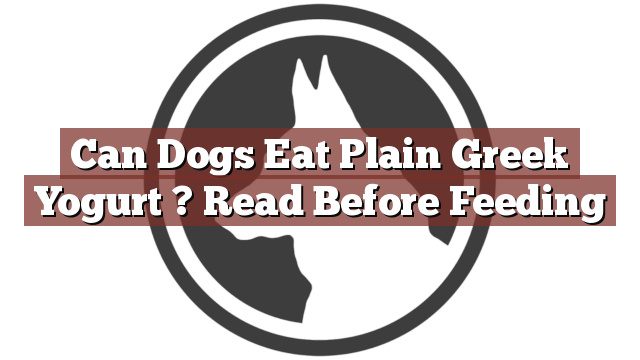Understanding Your Dog’s Dietary Needs
As a responsible pet owner, it is crucial to understand your dog’s dietary needs before introducing any new food into their diet. Dogs have specific nutritional requirements that differ from humans, and it is essential to provide them with a balanced and appropriate diet to ensure their overall health and well-being. While some human foods can be safe for dogs to consume, others can be harmful or even toxic. It is always best to consult with a veterinarian before introducing any new food into your dog’s diet.
Can Dogs Eat Plain Greek Yogurt? Read Before Feeding
Can dogs eat plain Greek yogurt? This is a common question among dog owners who are looking for alternative treats or supplements for their furry friends. The answer is yes, dogs can eat plain Greek yogurt in moderation. Greek yogurt is a rich source of protein, calcium, and probiotics, which can be beneficial for dogs. However, there are a few things to consider before including Greek yogurt in your dog’s diet.
Pros and Cons of Feeding Greek Yogurt to Your Dog
There are several benefits to feeding Greek yogurt to your dog. The protein content in Greek yogurt can help support muscle growth and repair. Additionally, the calcium content can contribute to healthy bones and teeth. Greek yogurt also contains probiotics, which can promote a healthy digestive system in dogs. These live bacteria can aid in digestion and improve nutrient absorption.
However, it is important to note that not all dogs can tolerate dairy products. While some dogs may have no issues digesting Greek yogurt, others may experience gastrointestinal upset, such as diarrhea or vomiting. If your dog has lactose intolerance or any other food allergies or sensitivities, it is best to avoid feeding them Greek yogurt. Always start with small amounts and monitor your dog’s reaction closely.
In Conclusion: Consider Your Dog’s Specific Needs Before Offering Greek Yogurt
In conclusion, while dogs can eat plain Greek yogurt, it is crucial to consider your dog’s specific needs before offering it as a treat or supplement. Greek yogurt can be a healthy addition to your dog’s diet, providing protein, calcium, and probiotics. However, it is important to monitor your dog’s reaction and consult with a veterinarian if you have any concerns or if your dog has any existing health issues. Remember, every dog is different, and what may be suitable for one may not be suitable for another. Always prioritize your dog’s health and well-being when making dietary choices for them.
Thank you for taking the time to read through our exploration of [page_title]. As every dog lover knows, our furry friends have unique dietary needs and responses, often varying from one canine to another. This is why it's paramount to approach any changes in their diet with caution and knowledge.
Before introducing any new treats or making alterations to your dog's diet based on our insights, it's crucial to consult with a veterinarian about [page_title]. Their expertise ensures that the choices you make are well-suited to your particular pet's health and well-being.
Even seemingly harmless foods can sometimes lead to allergic reactions or digestive issues, which is why monitoring your dog after introducing any new food item is essential.
The content provided here on [page_title] is crafted with care, thorough research, and a genuine love for dogs. Nevertheless, it serves as a general guideline and should not be considered a substitute for professional veterinary advice.
Always prioritize the expert insights of your veterinarian, and remember that the health and happiness of your furry companion come first.
May your journey with your pet continue to be filled with joy, love, and safe culinary adventures. Happy reading, and even happier snacking for your canine friend!

